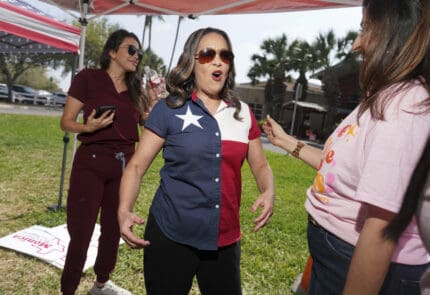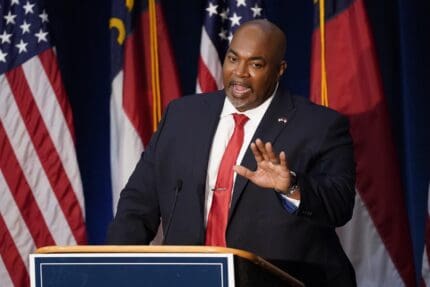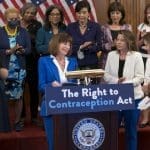GOP lawmaker: Congress voting safely from home is a plot to expand voting rights
Rep. Jim Hagedorn is opposed to allowing more people to vote by mail during a pandemic.

On Monday, Rep. Jim Hagedorn (R-MN) claimed that allowing members of Congress to vote on legislation from their home is a scheme to make it easier for all Americans to vote by mail in November.
In a Facebook post, Hagedorn called remote voting a “very bad idea,” even during the coronavirus pandemic, because it would be a slippery slope toward more Americans being allowed to vote by mail in the November presidential election.
Hagedorn is worried that Speaker Pelosi could change the House rules “in order to build an argument for universal mail-out/mail-in voting in 2020,” according to the post.
“You can already hear her say: ‘We changed the House’s rules so members did not have to vote in person and could remain safe from the coronavirus. We must do the same for average everyday citizens. That is why universal registration and mail-in voting is so important. If we make changes for members of Congress, we should also do so for the American people,'” he wrote.
According to Hagedorn, Americans voting by mail, thereby avoiding the danger of contracting a deadly virus, is bad.
Matthew Harwood, an expert on the issue of voting from the Brennan Center for Justice, wrote that absentee voting, or vote-by-mail, is necessary during upcoming elections.
“The coronavirus has made congregating in small, enclosed spaces dangerous,” Harwood wrote. “At many polling places, voters — particularly of color and from poorer communities — already wait in long, crowded lines to vote. During a pandemic, such lines would force citizens to choose between their health and their right to vote.”
“What the current crisis does is it just sheds a new light on the merits of this system,” Phil Keisling, a board member of the National Vote at Home Institute, said in March about absentee voting. “And at a minimum, it might be a strategy by which states can navigate through this unprecedented moment.”
Gov. Kate Brown (D-OR) wrote in an April 17 Newsweek op-ed that, “there should be no question that vote-by-mail programs are the best way” to hold elections during the current pandemic. “Vote-by-mail is proven as the most reliable and secure way for Americans to exercise their right to vote,” Brown added, noting Oregon votes have primarily voted by mail “for decades, and we now have one of the highest voter participation rates in the country.”
Hagedorn joins other Republicans in opposing the idea of making voting safer in the middle of a health crisis.
“Mail ballots — they cheat. OK? People cheat,” Trump falsely claimed on April 7. There is no evidence to back up Trump’s statement.
Trump himself voted by mail earlier this year and in 2018, and almost a dozen of his close aides and family members have voted by mail in the past.
In Wisconsin, Republican legislators and conservative judges refused to allow Gov. Tony Evers, a Democrat, to postpone an April 7 election, even though it forced people to risk their health in order to cast ballots.
While Massie and Hagedorn fight to force their colleagues to vote in person and endanger their health, at least five members of Congress have tested positive for coronavirus: Sen. Rand Paul (R-KY) and Reps. Mario Diaz-Balart (R-FL), Ben McAdams (D-UT), Joe Cunningham (D-SC), and Mike Kelly (R-PA). Rep. Nydia Velazquez (D-NY) announced on March 30 that she was presumed positive after developing flu-like symptoms.
As of Monday afternoon, there were more than 770,000 confirmed coronavirus cases in the United States, and at least 37,186 people have died.
Published with permission of The American Independent Foundation.
Recommended

Evolution denier Mark Robinson could reshape North Carolina’s education system
Robinson said science education should be taken out of elementary schools
By Jesse Valentine - May 16, 2024
SC governor to sign bill banning hormone therapy for transgender youth into law
Treatments for youth already taking the drugs could be gradually taken off them through Jan. 31
By Skylar Laird, South Carolina Daily Gazette - May 09, 2024
Ohio Gov. DeWine said he didn’t know of millions in FirstEnergy support. Is it plausible?
Ohio Gov. Mike DeWine’s claim to not know about the millions an Akron utility spent supporting his 2018 campaign for governor simply isn’t credible, an Ohio political scientist said in a recent interview. A spokesperson for DeWine pushed back. FirstEnergy provided that support, then spent more than $60 million to pass and protect a $1.3 billion ratepayer-financed […]
By Marty Schladen, Ohio Capital Journal - April 29, 2024
















































































